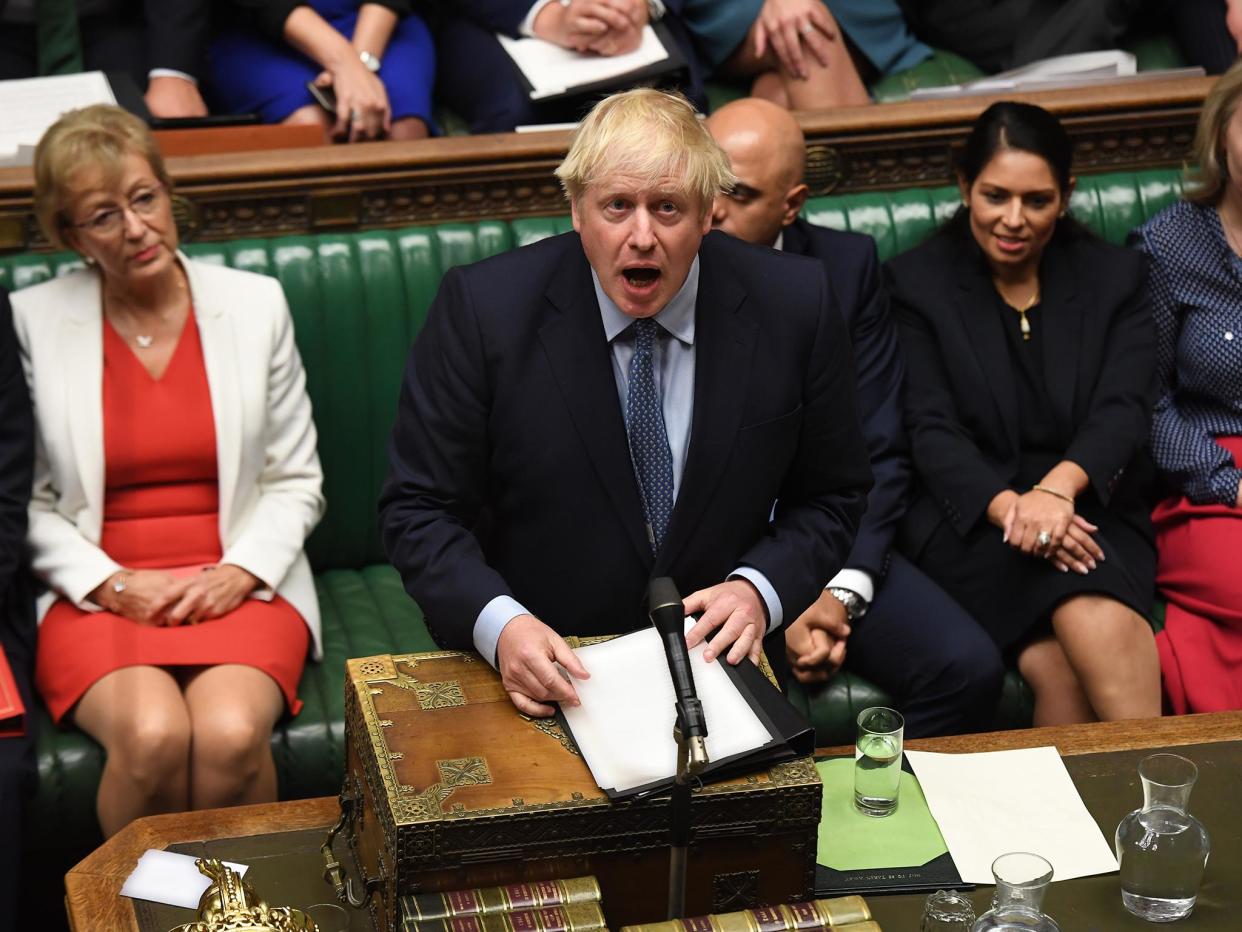Boris Johnson's rushed Brexit deal faces powerful headwinds whichever way it turns

Boris Johnson wants, and arguably needs, to return from the two-day summit of EU leaders on Friday waving a “deal in our time” piece of paper. We don’t yet know whether that might be a real deal, or an agreement in principle requiring further work on the vexed question of customs arrangements on the island of Ireland.
As intensive talks on a Brexit deal resumed in Brussels today, UK officials played down hopes of an early breakthrough. One EU insider told me: “We can see the outlines of a deal, but turning it into a legal text is the hardest part.” Another added: "Today the mood music is more pessimistic than yesterday" even if he pulls off a deal.
The negotiations are only the first hurdle Johnson must clear. He is very unlikely to deliver his pledge to take Britain out of the EU on 31 October, and will probably have to accept a delay of either one, two or three months – the latter being the length stipulated by the Benn Act. On the face of it, Nigel Farage would have a field day. Yet Johnson might avoid huge damage if he gets a deal. Without one, a delay would be very damaging for him.
His highest hurdle might well be the Commons vote, scheduled for Saturday if there is a deal in place. A very close vote is in prospect. Jacob Rees-Mogg, the Commons leader, sounded complacent to me when he told LBC the “votes are there now” for an agreement because “everybody’s desperate to finish this.”
True, there is Brexhaustion in parliament as well as in the country. Relief at a deal only a week after one looked very unlikely will work in Johnson’s favour. “The hope is that the momentum becomes unstoppable,” one cabinet minister said.
The good news for Johnson is that many hardline Brexiteer Tories trust him enough to swallow a deal they would have spat out if it had been served up by Theresa May. The penny has finally dropped in the European Research Group (ERG) that Brexit could be at risk, via an election or Final Say referendum, unless they bite the bullet now.
The bad news for Johnson is that the Democratic Unionist Party is not signed up. Ministers hoped they would buckle under pressure from businesses and farmers worried about no deal. But a customs border in the Irish Sea – which May said no British PM could accept – might prove a step too far for DUP MPs, who argue that “our people’s” top three priorities are “the Union, the Union, the Union.”
The DUP enjoys much more clout than having 10 MPs suggests. Several ERG members would take their cue from Arlene Foster’s party. Johnson has kept her at least as closely informed about the negotiations as his cabinet, probably more so.
But without the DUP on board, Johnson would need the votes of more Labour backbenchers than he might land. Tory whips hope for 20 Labour backers, mostly representing Leave areas. They would like in principle to vote for a deal, which might enhance their survival prospects in an early election. On the other hand, defying a three-line-whip to oppose an agreement could see them deselected, and unable to run under Labour’s colours.
Jeremy Corbyn was always going to oppose any Johnson deal, fearing he might cash in a Brexit dividend at an election. In fact, Johnson is making Corbyn’s life easier, with an agreement Labour can portray as even worse than May’s.
Downing Street has kept secret its draft political declaration on the long-term UK-EU relationship to avoid frightening Labour horses. It is expected to drop May’s pledges to meet EU standards, such as on workers’ rights and the environment.
So Labour MPs tempted to back the likely deal should ask themselves why they would back a harder Brexit than they have already opposed. They should also note that right-wing, pro-deregulation Tories like Johnson’s language about a “super Canada” free trade agreement.
In fact, academics in the respected Britain in a Changing Europe group predict it would look more like “Canada-minus,” with minimal coverage of the service industries which account for 80 per cent of the UK economy. Its study found that GDP per capita 10 years after Brexit could be reduced by between 2.3 and 7 per cent, compared to remaining in the EU. For May’s deal the numbers came in at between minus 1.9 and 5.5 per cent.
Despite previous predictions that scores of Labour MPs would vote for a Brexit deal, only a handful did. History might repeat itself unless Johnson conjures up an unexpected rabbit and commits to a “level playing field” like May. But then the Brexit see-saw would tip the other way; he would alienate many of the Tory Eurosceptics whose votes he also needs.
MPs should look carefully before they leap, and not be bounced into approving a last-minute deal. It would probably look nothing like the one promised by Brexiteers in 2016. So MPs should do what they were sent to parliament to do and exercise their judgment. As the march in support of fresh vote heads to Westminster on Saturday while they debate a Johnson deal, MPs should recognise the overwhelming case to ask the people whether they support it in a Final Say referendum.

 Yahoo News
Yahoo News 
